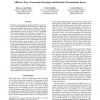Free Online Productivity Tools
i2Speak
i2Symbol
i2OCR
iTex2Img
iWeb2Print
iWeb2Shot
i2Type
iPdf2Split
iPdf2Merge
i2Bopomofo
i2Arabic
i2Style
i2Image
i2PDF
iLatex2Rtf
Sci2ools
116
click to vote
FLAIRS
2011
2011
Affective Text: Generation Strategies and Emotion Measurement Issues
In affective natural language generation (NLG) a major aim is to be able to influence the emotional effects evoked in the addressee through the intelligent use of language. While previous work has shown that varying the form of the language, while keeping the content the same, can have a measurable effect on the emotions of the addressee, we report here on work which investigated which linguistic techniques to give the text a more or less positive slant contribute to these emotional effects. We report on three studies in which texts that gave positive feedback on an IQ test performance were tested for emotional effects on the recipient. The first study followed a comparison method on the sentence level, and the second study compared the texts as a whole. In both of these, participants were asked to rate the emotional effects that they thought the texts would have. On the other hand, in the third study different types of feedback were evaluated in a context of use, where participants...
Artificial Intelligence | FLAIRS 2011 | Iq Test | Linguistic Techniques | Natural Language Generation |
Related Content
| Added | 28 Aug 2011 |
| Updated | 28 Aug 2011 |
| Type | Journal |
| Year | 2011 |
| Where | FLAIRS |
| Authors | Ielka van der Sluis, Chris Mellish, Gavin Doherty |
Comments (0)

